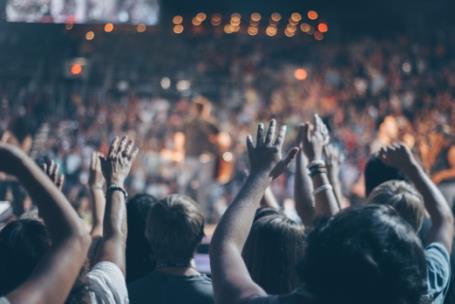
 Due to the (mostly unintentional) role of some religious groups as super-propagators of the virus (along with secular types of gathering), religious meetings—especially large ones—are being seen as potential sources of trouble. When it comes to individual attitudes and practices toward social distancing, there is not a great difference between those from various religious and non-religious groups. A survey conducted among a national sample of 2006 individuals by the polling company Morning Consult (conducted March 17-20), finds that the religious were even more likely to practice social distancing. Eighty two percent of evangelicals and 89 percent of religious non-Protestant/Catholics practiced social distancing, compared to agnostics at 78 percent and atheists at 80 percent. But a study in the online magazine Quillette (April 23, 2020) raises the interesting question of how religious gatherings may have served as “superspreaders” of CV-19. Superspreaders are those people, groups, or places that are more likely to pass on the virus through their practices of gathering large numbers of other people in close contact, often marked by singing or shouting. Jonathan Kay created a data base of superspreader events in 28 countries, though he acknowledges that the information was limited in several countries.
Due to the (mostly unintentional) role of some religious groups as super-propagators of the virus (along with secular types of gathering), religious meetings—especially large ones—are being seen as potential sources of trouble. When it comes to individual attitudes and practices toward social distancing, there is not a great difference between those from various religious and non-religious groups. A survey conducted among a national sample of 2006 individuals by the polling company Morning Consult (conducted March 17-20), finds that the religious were even more likely to practice social distancing. Eighty two percent of evangelicals and 89 percent of religious non-Protestant/Catholics practiced social distancing, compared to agnostics at 78 percent and atheists at 80 percent. But a study in the online magazine Quillette (April 23, 2020) raises the interesting question of how religious gatherings may have served as “superspreaders” of CV-19. Superspreaders are those people, groups, or places that are more likely to pass on the virus through their practices of gathering large numbers of other people in close contact, often marked by singing or shouting. Jonathan Kay created a data base of superspreader events in 28 countries, though he acknowledges that the information was limited in several countries.
Kay finds that many of the superspreader events comprised gatherings of highly mobile and high-income people (such as those on ski trips), but of the 54 superspreaders in the data base, “no fewer than nine were linked to religious services or missionary work. This includes massive gatherings, such as February’s weeklong Christian Open Door prayer meeting in Mulhouse, France, which has been linked to an astounding 2,500 cases, and a massive Tablighi Jamaat Islami event in Lahore that attracted a quarter million people [and in other Indian cities].” The religious superspreading events also included smaller gatherings, such as proselytizing efforts in rural Punjab villages and a religious meeting in a Calgary, Canada home. Kay notes that most of the world’s religions were represented in his list, but the virus does seem to prey on emotion-filled and intimate meetings with collective prayer, something that Tablighi and the French Christian prayer meetings had in common.
Specific outbreaks of the virus that have been limited to specific religious groups can be explained by their strong in-group ties. This can be seen in how the outbreak of the virus in the Navajo Indian country of Arizona was first spread from religious ceremonies that brought thousands of tribe members together. The Hasidic Jewish communities may not be superspreaders since members don’t regularly interact with outsiders, but this movement has seen heavy losses from the virus. The Jerusalem Post (April 22, 2020) reports that Hasidic leaders in the New York area disregarded public health calls to quarantine, holding mass funerals of rabbis and Purim celebrations until late March. With now over 300 deaths and thousands contracting the virus, including the grand rabbi of the Satmar Hasidic community of Brooklyn, the Hasidic communities are largely abiding the quarantine. But the community, especially in Brooklyn, will face hard winds of financial decline from the lockdown, since it depends on sales from the Passover season to sustain itself.
The Church of God in Christ, the country’s biggest African American Pentecostal denomination, has suffered extensive losses in leadership, with at least a dozen to up to 30 bishops and prominent clergy dying of covid-19, according to the Washington Post (April 19, 2020). Michelle Boorstein reports that the deaths of leaders in states including Michigan, New York and Mississippi are in regions where both the church is strong and where the coronavirus has hit hard. She adds that local health officials say specific outbreaks that led to the deaths appeared to stem from conferences, typically held in February and March, and funerals held within the denomination. Anthea Butler of the University of Pennsylvania says that this crisis will “upend the axis of leadership in a way they may need to think about, including how do we put in younger people.” Because black institutions are susceptible to the impact of the coronavirus, as it has disproportionately affected African Americans, the “ecosystem of black church life will likely change…It’s showing the inequities of health disparities and economic disparities in the black community,” she adds.
(Morning Consult, https://morningconsult.com; Quillette, https://quillette.com/2020/04/23/covid-19-superspreader-events-in-28-countries-critical-patterns-and-lessons; Jerusalem Post, https://www.jpost.com/Diaspora/How-New-York-hassidic-communities-have-been-buffeted-by-coronavirus-624896?)